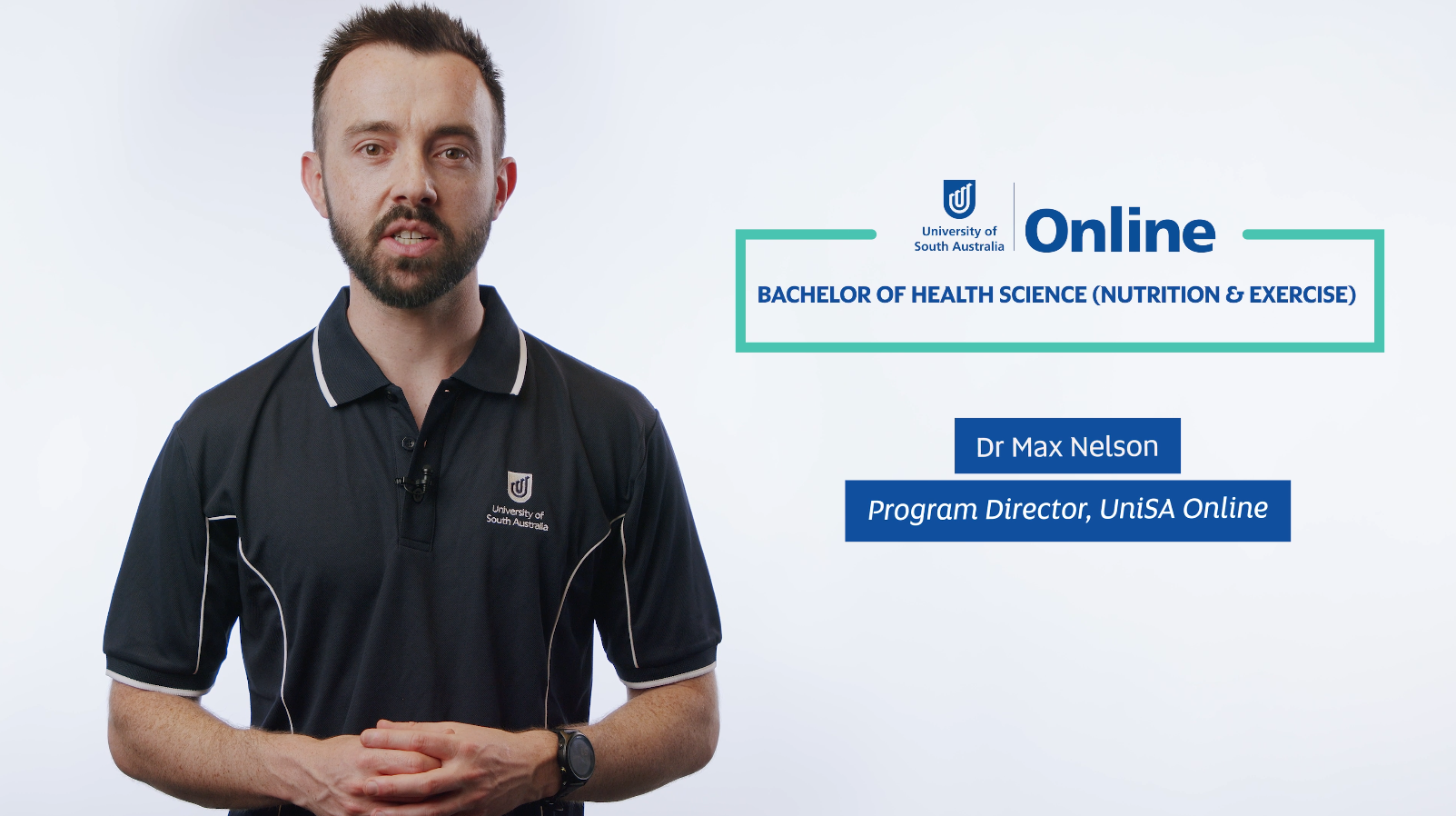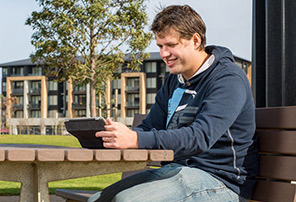You're viewing degree information for International students
You're an International student if you are:
- NOT an Australian or New Zealand citizen
- NOT an Australian Permanent Resident (including Permanent Humanitarian Visa holders)
Please remember your residency (the country you are currently in) has no impact on whether you are an Australian or International student.
UniSA Online degrees normally require international students to study outside of Australia. If you would like to study a UniSA Online degree within Australia, your visa conditions will need to allow online study. For advice on eligibility to study onshore in Australia, please contact us.
Bachelor of Health Science (Nutrition and Exercise)
Degree Level Undergraduate
Year 2025
-
View full entry requirements Hide full entry requirements
Entry requirements
Admission criteria
The admission criteria have been grouped to assist you to easily find the information most relevant to your circumstances. However, you may fit into more than one and the university will consider applicants against each of the relevant criteria.
Certain conditions apply. For more information refer to Appendix 4 of the University's Selection and Entry policy.
Applicants are required to meet one of the following criteria with a competitive result:
Higher education study
- Successfully completed equivalent to a minimum of half a year of full-time study of a higher education program at a recognised higher education provider
OR
Vocational Education and Training (VET)- Complete an award from a registered training organisation at Certificate IV or above
OR
Work and life experience (for domestic students only)- Passed a UniSA Online literacy and numeracy test and have relevant work experience, or
- Completed a 12-month UniSA Foundation Studies program or equivalent, or
- Qualify for Special Entry
OR
Recent secondary education- Completed a secondary education qualification equivalent to SACE, such as an interstate year 12 or international qualification
Essential requirements for admission
Prerequisites
NoneAssumed Knowledge
NoneEnglish language entry requirements
In addition to meeting academic entry requirements, international students who speak English as a second or additional language must also meet the University's English language entry requirements. The minimum language requirements for this program are:English language testPlease access the following link for a comprehensive list of English language tests accepted by UniSA and other important information in relation to meeting the University’s language requirements: English Language Equivalence Table (PDF)- IELTS total [6.5]
- IELTS reading [6.5]
- IELTS writing [6.5]
- IELTS speaking [6.5]
- IELTS listening [6.5]
Admission Requirements by Country
Bangladesh HSC 3.5 Canada High School (OSSD) 60 Eynesbury FSP 310 German Abitur 3.8 Kenya KCSE (average) B Malaysia STPM (best 3) 6 Malaysia UEC 32 Norway GPA 2.8 Pakistan HSSC 75 Sri Lanka A Levels (best 3) 6 Sweden GPA 12.5 UK Board GCE A Levels/HK Board 6 Vietnam 7 Australia 65 IB (best 6) 26 USA SAT (1600) 1050 India (best 4) State Board 70 India (best 4) Central Board 60 HKDSE 15 Nepal NEB 2.41
Degree overview
- Take a holistic learning approach to nutrition and exercise
- Build your skills in two highly complementary fields
- Develop the knowledge and skills to support community health and wellbeing through physical activity and good nutrition
- Be guided by experts and world-class researchers who are at the forefront of new discoveries in exercise and food sciences
- UniSA’s research in the area of health sciences is recognised as world-class.1
- Study with a university ranked in the World Top 100 for Exercise and Sport Science.2
1Results in Public Health and Health Services - 2018 Excellence in Research for Australia (ERA).
22024 QS Subject Rankings - Sport-Related Subjects.
Snapshot

Study On Demand – a 100% online nutrition and exercise degree designed specifically for online learning. Take full control over your study - access support seven days a week, plan your study to fit around your life, view learning resources 24/7, and log into the interactive online environment anywhere, any time and on any device.
With the prevalence of obesity, diabetes, cardiovascular disease, as well as an ageing population, health practitioners who have expertise in both nutrition and exercise are highly sought after.
Take your passion for nutrition and exercise to the next level and study a unique degree that builds your skills in two highly complementary fields. With a focus on real-world learning, you’ll leave with specialised knowledge and practical skills to promote nutrition and exercise for preventative health, while developing the skills to inspire a healthy and more active society.
The flexibility of this degree puts you in control of when and where you study. As a UniSA Online student, you'll receive personalised and extended-hour support so you have the best chance to succeed and thrive in your studies.
What you'll learn

Our nutrition and exercise degree explores the latest cutting-edge developments in health.
Discover the effects that food, nutrition, health and exercise have on the biological, psychological and social aspects of life. Explore diets and lifestyles for optimum health and the associations between nutrient intake, energy output and obesity. You’ll also learn how nutrition and diet affect physical activity and lifestyle changes, as well as how to maximise physical performance for healthy active people.
Some of the courses you’ll study include:
- Professional Communication to work in the Health Industry
- Psychology of Exercise, Sport and Health
- Nutrition for Exercise and Performance
- Health Promotion & Project Management for Health and Wellness
- Food as Medicine
You can tailor your degree to your interests and broaden your career prospects through your choice of electives. You can select two electives from a range of UniSA Online degrees.
Why Bachelor of Health Science (Nutrition and Exercise)

Nutrition and exercise go hand in hand when it comes to living a healthy life. Health practitioners with a dual skill set in these two important areas of health are in demand.
In this degree, you'll develop expert knowledge on national physical activity and dietary guidelines, as well as current and emerging trends in the industry. In addition to building skills in health evaluation, project management and biological sciences, you'll also explore relationships between individuals and society that lead to population health patterns.
As a graduate, you'll come out with the skills to interpret scientific research and analyse quantitative and qualitative data to translate science into practical eating and exercise advice.
This degree allows you to put your knowledge into practice - you’ll work on projects that have the potential to make a difference to the health and well-being of those around you.
Our teaching staff come with many decades of experience in exercise science and nutrition education. As a student, you'll learn from expert academics and researchers who are leaders in their field.
Learn more about the benefits of studying nutrition and exercise >
Your career
As a health professional, your career opportunities are extremely varied. There are many opportunities for health professionals in federal, state and local government, the not-for-profit sector, private enterprise and at a very grass-roots level in community agencies. You could also work in health agencies, hospitals, universities and health research institutes.
You may decide to specialise in a certain area like workplace health, community development, alcohol and drug abuse, smoking or teenage pregnancy – or you may decide to work with particular client groups such as the elderly, people with disabilities or high performing athletes.
A UniSA Online Nutrition and Exercise degree can help you pursue the following careers:
-
Health and wellness lifestyle adviser:
provide advice related to diet and nutrition, exercise, and general health and wellbeing, in a variety of settings, and to a diverse range of community groups and individuals including children, the elderly, expecting mothers, and athletes; support individuals to set and review goals on a regular basis; identify and apply best practice behavioural strategies to help individuals achieve their health goals; and coach people to identify and respond to psychological challenges in relation to healthy eating and exercise. -
Nutrition and exercise consultant:
help assess and increase an individual’s fitness, sporting performance and general health; apply evidence-based approaches for weight management; and understand nutritional, environmental and sociocultural influences on health and body weight; stay up-to-date with the latest scientific research in nutrition and exercise, and offer advice consistent with the National Physical Activity Guidelines and the Australian Guide to Healthy Eating. -
Corporate health and wellness adviser:
possess a high level of knowledge regarding contemporary Workplace Health and Safety (WHS) practices and risk management protocols; contribute to workplace wellness initiatives and programs; provide advice to senior management on issues involving health, safety and wellness; and identify opportunities to weave mental, physical and well-being into the organisational culture. -
Health promotion officer:
plan and develop policies, strategies and projects that promote health at a local, regional or national level; develop the health awareness of individuals, groups and organisations; run community training courses and workshops; write and produce leaflets, posters, videos and brochures to aid health promotion in different environments; and ensure work is underpinned by up-to-date knowledge of health promotion theory. -
Active and healthy ageing adviser:
promote, build and support the health and well-being of older people; identify and promote effective active and healthy ageing programs and strategies; disseminate evidence, research and data relevant to active and healthy ageing; and work with local government, community organisations, peak bodies, health providers and sporting organisations to build and support age-friendly environments relevant to older people.
Learn more about your career in Nutrition and Exercise >
Thinking of studying soon?
Industry facts
Enquire now to study with UniSA Online
Control how and when you study with our 100% online degrees.
Your study experience and support
Study On Demand
Our online career-focused degrees give you full control and ultimate flexibility over your study. It’s Study On Demand, on your schedule, on your terms.
- Designed specifically for your online learning
Designed by a team of academic and online experts, our course materials are delivered in an interactive way using innovative digital technology and state-of-the-art teaching and learning resources. - Study when it suits you
Our online degrees support students who lead busy lifestyles. With four start dates a year in January, March, July and September there is no need to interrupt your life. - Take control of your study schedule
With all content available from day one of your course, you have the power to plan your study schedule in advance. - Finish each course in 10 weeks
Our courses are delivered within 10-week terms to keep you motivated throughout your degree. Study two courses a term or just one. - 100% online study
You won’t need to come onto campus for coursework, assessments or exams. Complete all study for your degree where it suits you. - Get the help you need
Whether you need help with course content or assessments, we offer the academic support and services you need to be successful in your studies. - Adjust your study to your life
There’s no need to interrupt work and family life or spend money on travel and student accommodation. Organise study around your life. - Learn from world-renowned academics
Get a degree that’s designed and taught by leading academics and industry professionals. - 100% online interactive learning environment
Our interactive online learning environment supports all your study needs. Log in anytime, on any device, wherever it suits you. - Access a library of over 700,000 digital resources
Access a library of more than 700,000 digital resources including e-books, videos and journal articles. Our Ask the Library virtual service can help you locate, access, evaluate, use and reference a range of information resources.
What others are saying
IT Requirements
Generally, any desktop or laptop computer purchased in the past three years should be capable of meeting your online learning needs. While mobile devices such as tablets and smartphones will be able to access most of your online course content, there are likely to be elements of most courses where we recommend you use a desktop or laptop computer. Your computer should be able to:
- run a modern browser (Microsoft Edge, Firefox 24, Safari 5, or Chrome 32 or later versions)
- run Java
- run programs to create documents, spreadsheets and presentations
- use a web camera and headset (or ear pods with microphone)
- Some UniSA Online degrees require an online exam. The online exam software – Remote Proctor Now – has specific capability requirements. Please refer to the system requirements prior to conducting your exam to ensure your computer is compatible.
Access free IT software and resources
As a UniSA Online student, you'll:
- Get free access to the full Office 365 ProPlus suite, which includes full versions of Word, PowerPoint, Excel, Outlook, OneNote, Publisher, Access and Lync software. Install the full suite on up to five different devices (PC and Mac compatible).
- Get 1Tb of personal storage that syncs with your PC or mobile device through OneDrive - it's like an extra hard drive that allows you to open any of your files from any of your devices, whenever you need them.
- Get free access to LinkedIn Learning - Access more than 5000 video courses on a broad range of topics such as: the Microsoft Office suite, time management and study skills, health and wellbeing, communication and presentation skills, photography, film making and designing your own games or mobile apps.
- Be able to connect with others using Microsoft Teams, Yammer and the Outlook Web App.
There are some degrees that have specialised software requirements. We've made this software available to students to access for free - you'll be able to download and install any of the required programs on your own device anywhere and anytime. See if your degree requires specialised software.
Check your device
Our computer system test will determine if your device has the base system resources and software required to study online. It'll also check the speed of your internet connection.
See if your computer, laptop or device is all set up and ready to go – it takes just a few seconds.
The application process is easy – just follow these simple steps:
-
Submit an online enquiry
If you're ready to apply, the first step is to fill out and submit our online enquiry form. Here you'll be asked a series of questions to see if you're eligible. Following your online enquiry, one of our Degree Advisers will contact you at your preferred time to discuss the application process.
Enquire now > -
Speak to a Degree Adviser and start your application
If you're eligible, you'll receive an email outlining the entry requirements and the relevant documentation you need in order to be considered.
In order to verify your academic qualifications, you'll need to upload relevant documents like your official parchment, certificates or transcripts. If you have work experience, you will need to upload your CV as well as any other documents like work references, professional recognition or accreditation or your training certification.
Your email will contain information on the specific documents you need to provide as well as a link to begin your application. You'll be asked to create an account and set your own password.
-
Complete your application and send through your documents
In order to proceed with your conditional offer, you’ll need to complete your application and provide required evidence of your previous study or work experience.
Enquire now >
Alternative Pathways
- UniSA College Diploma in Health (Sport)
- UniSA College Undergraduate Certificate in University Studies (Health)
- UniSA Online UniStart
Online Course Facilitator
-
When should I apply?
UniSA Online degrees start four times a year in January, April, June and September. There are key application dates for each term. If you're looking to apply for credit, there are different closing dates you need to be aware of, so it's always best to double check. Key dates can be found at unisaonline.edu.au/key-dates.
-
Do I have to be online at set times?
All of our courses are asynchronous, meaning you choose when to study, whenever it suits you. However, if your degree has online exams, you will need to sit these at a designated date and time. Some courses may also require you to speak to your academics via phone or online communication channels at a mutually agreed time as part of your assessment.
-
What academic support is available?
Our academics are available seven days a week, including weeknights. Throughout your degree, you’ll be supported by our highly experienced academic team of Online Course Facilitators and casual academics. Our teaching team will guide you through your learning and ensure you have an outstanding, high-quality education.
They can help you with your course materials and assessments, provide feedback on your work, assist you with referencing, and can answer any other course-specific queries.
You’ll be able to contact your academics via email, online discussion forums and live messages in the online learning environment. You can also communicate in real-time and chat face-to-face with your academics online.
If you need after-hours learning support, Studiosity is a great resource that can help you with your writing, academic language, grammar and referencing. You’ll also be able to chat online with a Studiosity online adviser.
-
How is my degree structured?
Full-time students study two courses each term. It makes earning a degree completely achievable, especially if you’re working. Your degree is delivered over four terms each year. Each term runs for ten weeks with two-week breaks in between each term.
You’ll also have the option to go part-time, or switch between the two. If you need to take a break in your study, that’s an option too. We recommend speaking to your Student Adviser who can help you update your study plan and check when your courses are offered.
-
What career prospects do I have with my university qualification?
Our degrees are designed in conjunction with industry experts, employers and professional associations, and informed by the latest developments in your field. You will graduate with in demand skills and up-to-date knowledge required by industry.
You will be studying with a university known for its employment outcomes. Your UniSA degree is more than just a piece of paper – it will prepare you to start your career, or take it to the next level. UniSA's online students have graduate employment rates well above the national average.*
UniSA Online qualifications follow the same Government Higher Education Standards Framework as our on-campus degrees. The parchment you receive at the end of your degree will be the same as any other University of South Australia student.
*UniSA External UG full-time employment rate 83% Graduate Outcomes Survey 2018
-
What are the main differences between online, on-campus and distance education?
The knowledge you gain from each mode of study is the same – it's how you get there that's different. When you study online, everything from your course material to weekly activities and assessments are fully online. You'll communicate with academic staff and students via live messages, online discussion forums and email.
Studying on campus requires students to physically come on to campus at specific times to attend lectures, tutorials and practicals. On-campus students have face-to-face contact with academics and fellow students and also communicate via email and online discussion boards.
Distance Education involves physical course material packages being sent to students, usually print based but occasionally audio or video. Communication is usually via telephone, mail and email. In today’s digital era, distance education has been superseded by online education.
More FAQs










